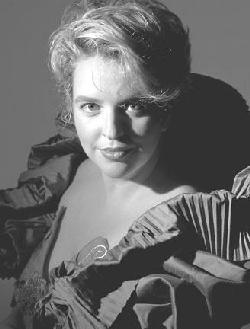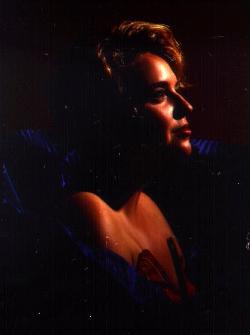Karina Gauvin Goes Solo
October 1, 1997
Version française...
Soprano Karina Gauvin is a
rising star on the Canadian classical music scene. Victories in
several vocal competitions have propelled her to national and
international prominence. Gauvin has already contributed to two
recordings on Quebec’s Analekta label: Beethoven’s Egmont (FL
23105), and Bach’s "Little Notebook of Anna Magdalena Bach" (AN2
8251) with harpsichordist Luc Beauséjour (Analekta’s reported sales
figures of 4000 units make the Bach album one of their most
successful titles). On October 6th, 1997 Analekta will release
Karina Gauvin’s first solo album - Vivaldi motets accompanied by Les
chambristes de Ville-Marie - in conjunction with a concert of the
same program the same night at Centre Pierre-Péladeau (broadcast
live on Radio-Canada: see calendar). Judging by the enthusiastic
response to a free public run-through of this program at the
Conservatoire de musique de Montréal before the recording sessions
last May, the upcoming concert and disc should be another success.
La Scena Musicale spoke with Karina Gauvin
about the recording experience.
 LSM: How many
recordings have you made so far? LSM: How many
recordings have you made so far?
KG: This will be my third for Analekta. For my
first recording, I got a call from Luc Beauséjour who had heard
about me from another musician. Luc asked me if I wanted to record
the "Little Notebook of Anna Magdalena Bach". My second recording
was the Beethoven Egmont with the
Orchestre Metropolitain. Recordings are good for promotion. It’s
also important to reach the people at home who may not be able to
come to a live concert.
LSM: Are you an
exclusive Analekta recording artist?
KG: No, each project has developed
separately. For the Bach and the new Vivaldi recordings I have
retained the copyright, though it’s not always the norm. It’s
different for the second disc because it is an Orchestre
Metropolitain recording. I control content, the cover and the
layout. As artists. it is important that we have some control over
our image. I negotiated my first recording contract, but now that I
have an agent. She negotiated the Vivaldi contract.
LSM: How did the Vivaldi recording come
about?
KG: Analekta’s representative heard me sing
Vivaldi’s O qui coeli motet in concert with the Ensemble
Amati in the spring of 1996. Analekta did not have any Vivaldi in
their catalogue so their president Mario Labbé asked me to develop a
Vivaldi project. I had carte blanche to put together a
program. I went through the Vivaldi repertoire and selected my
favourites. The whole process took one and a half years. I put the
program together the same way I design a recital. Each piece has to
be interesting in its own way, for variety. I don’t use filler.
Naturally, O qui coeli is on the new disc. We also have a
piece that has never been recorded before called Sum in medio
tempestatum . It is quite a crazy piece to sing. The voice has
to perform like a violin. There are many difficult runs and passages
with no place to breathe. We also have Laudate Dominum that I think has only been
recorded once. So the disc contains familiar and unfamiliar Vivaldi,
with a good mixture of slow and fast tempi.
LSM: Tell us
about the orchestra.
KG: Les chambristes de Ville-Marie is a
seven-member orchestra that my husband Jean-François Gauthier formed
for the recording. Because I helped pick the musicians I had perfect
confidence in them. Jean-François played the harpsichord and the
organ. Because we try to recreate period practices there was no
conductor and tempi depended largely on my singing. Our whole group
listened to a tape of the conservatory recital and made improvements
for the recording.
LSM: Where was
the Vivaldi recorded?
 KG: The recording
sessions were held at the St. Augustin de Mirabel Church, the same
as for the "Anna Magdalena" recording. People think
you can do 100 takes and piece together the good parts, but that
really doesn’t work. The real challenge is to prepare the imagery in
your mind as you would for a live audience. To produce this one-hour
disc took one day for the sound check, then three days of four-hour
sessions and another day of a two-hour session. When I wasn’t
singing I took ten minute breaks. I was just eating, singing and
sleeping. By comparison, my twenty minutes on the Bach recording
took three three-hour sessions. The musicians were arranged in a
semi-circle at the altar. I faced the orchestra from an elevated
platform about ten feet down the centre aisle. I had my microphone
and they had theirs. With this arrangement, they could see my every
move and my breathing, and could follow me but it was far enough
that they also had to listen to me. We had a wonderful team who
always gave 100%. Each of them brought something special to the
work. The recording process is emotionally wonderful but physically
exhausting. I had to put every drop of energy into the sessions
because every second is recorded. In a live performance you can’t
expect perfection, but in a recording the mikes capture everything. KG: The recording
sessions were held at the St. Augustin de Mirabel Church, the same
as for the "Anna Magdalena" recording. People think
you can do 100 takes and piece together the good parts, but that
really doesn’t work. The real challenge is to prepare the imagery in
your mind as you would for a live audience. To produce this one-hour
disc took one day for the sound check, then three days of four-hour
sessions and another day of a two-hour session. When I wasn’t
singing I took ten minute breaks. I was just eating, singing and
sleeping. By comparison, my twenty minutes on the Bach recording
took three three-hour sessions. The musicians were arranged in a
semi-circle at the altar. I faced the orchestra from an elevated
platform about ten feet down the centre aisle. I had my microphone
and they had theirs. With this arrangement, they could see my every
move and my breathing, and could follow me but it was far enough
that they also had to listen to me. We had a wonderful team who
always gave 100%. Each of them brought something special to the
work. The recording process is emotionally wonderful but physically
exhausting. I had to put every drop of energy into the sessions
because every second is recorded. In a live performance you can’t
expect perfection, but in a recording the mikes capture everything.
LSM: Would you
consider issuing a live performance on CD?
KG: That’s unlikely because I am a
perfectionist. When I listen to my live broadcasts I usually have
some reservations. Even though I may have thought it was good, when
I listen to it later, I sometimes find that I haven’t achieved what
I expected. As musicians, we are in constant evolution, striving for
perfection but never attaining it. When I work, I always tape
myself. I’m hoping that one day I will be able to say "That was
amazing" but listening to yourself can be a rude awakening.
Sometimes, I get really depressed if I can’t convey my idea of the
piece. I had a crisis with the "Anna Magdalena" recording
- at
one point I didn’t want it released. That’s part of being an artist.
You have to have the humility to accept your limitations and work on
improving. Perhaps in five years I’ll be more easily satisfied with
my performances.
LSM: Will the
concert on October 6 differ from the recording?
KG: The concert will be broadcast live, so there
will be a lot of performance pressure. My interpretations might
differ because I have developed new ideas since the recording
session. But new ideas show that you are evolving as an artist. When
you stop searching, art dies.
Version française... | 

